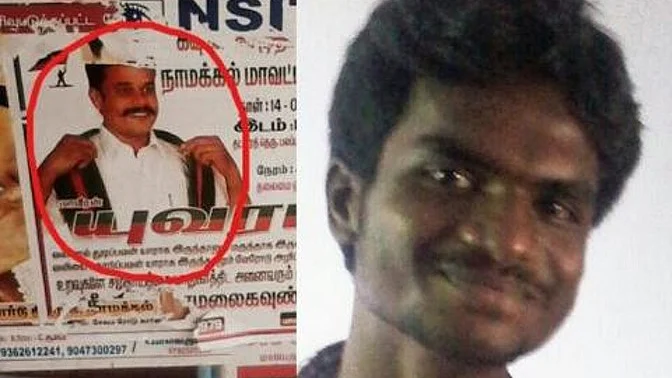B R Ambedkar once wrote, “Inequality is not half so dangerous as graded inequality”.
Every time a Dalit is killed in Tamil Nadu, the birthplace of the purportedly anti-caste Dravida movement, his words ring true.
It has been over a fortnight since the cause of death of Dalit youth Gokulraj, originally and ridiculously deemed ‘suicide’, was altered to ‘murder’.
Over the last week, at least six people have been arrested, but the prime accused, Yuvaraj, is still absconding.
Gokulraj was allegedly killed because members of the outfit to which Yuvaraj belonged had found him talking to a Caste Hindu girl. The girl later said they were not lovers, and had met to pray at the Ardhanareeswarar Temple in Tiruchengode.
Anti-Dalit Crimes Aren’t Isolated Incidents
The discovery of Gokulraj’s body bears a striking similarity to the manner in which another Dalit youth’s corpse was recovered, two years ago. That young man was Ilavarasan, whose inter-caste marriage to Divya, a woman from the Vanniyar community, had caused caste riots in Dharmapuri district, in the course of which 250 Dalit homes were set on fire.
Both men were found on the railway tracks. Suicide notes were found on both. In Ilavarasan’s case, the Railways stated that no accidents had been reported on trains that had passed through Dharmapuri on July 4, 2013, the date of his death. The cause remains murky.
These two cases of national prominence are, unfortunately, only a small percentage of the atrocities against Dalits in Tamil Nadu. Just in the last two months, a disabled Dalit teenager has committed suicide after being raped, and two Dalit men have been murdered in Tuticorin district.
Suicides of Dalit school students who are bullied by their Caste Hindu counterparts are such commonplace occurrences that they are tucked away in the inside pages of newspapers.
Incidentally, the outfit accused of murdering Gokulraj – Dheeran Chinnamalai Peravai – is also reported to be the one which started an agitation against author Perumal Murugan over his book Maathorubagan, based in the region around the same Ardhanareeswarar temple outside which Gokulraj went missing.
Caste Chauvinism a Cover for Vote Bank Politics?
The ongoing oppression of Dalits in a state which prides itself on being progressive is disheartening. It has been nearly a century since the Dravida ‘self-respect’ movement began under the leadership of E V Ramaswamy Naicker.
Ironically, this movement began with an anti-caste agenda, claiming that its aim was to end Brahmin hegemony and ensure equality. Yet, the people of Tamil Nadu wear their caste labels with pride – most political parties in the state have not just a caste-bias, but a caste-basis. Their leaders are caste patrons, and they capitalise on their caste-pride and caste-centric election promises to create vote banks.
Since its inception, the Dravida movement has strayed, using linguistic chauvinism to gradually channel its resources towards caste-based reservation and therefore, vote bank politics. The idea of taking pride in one’s language had segued into the idea of taking pride in one’s roots. These roots are caste-oriented.
The Dravida movement singled out Brahmins as oppressors and promised reparations through reservation. They have only succeeded in replacing the original oppressor with other castes, while the Dalits continue to be subjugated.
Why the Dravida Claim of Caste Equality is an Empty Boast
The alienation of Dalits from this system of reformation is evidenced by the reservation chart. In 1951, the reservation figures were 25% for Backward Classes and 16% for Scheduled Castes and Tribes. Now, the total percentage of reserved seats in Tamil Nadu is an unconstitutional 69%, with 50% reserved for various categories of Backward Classes, 18% for Scheduled Castes and 1 % for Scheduled Tribes.
There has been a scramble for demotion among the Caste Hindus, in order to benefit from reservation, but despite fighting for their castes to be shifted from ‘Forward Class’ to ‘Backward’ and ‘Most Backward’, they have retained their ideas of superiority-by-birth.
When the Dalits have been left behind, and are today denied their fundamental rights – to study, to work, to love, to live, to talk – how can the Dravida parties claim to have fostered caste equality? The idea that is central to their original philosophy collapses anew every time a Dalit asserts himself.
(Nandini Krishnan is a writer, playwright, columnist, and stand-up comedienne. She tweets @k_nandini.)
